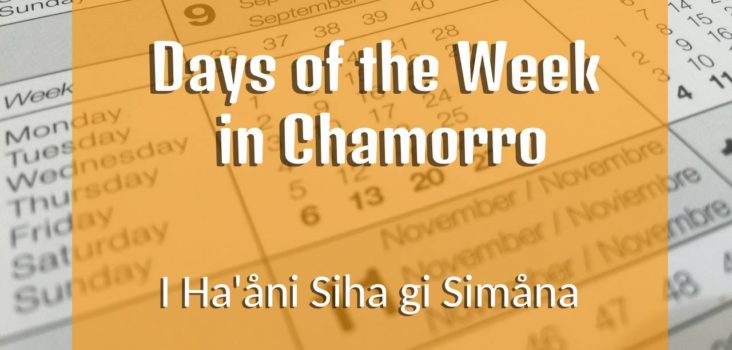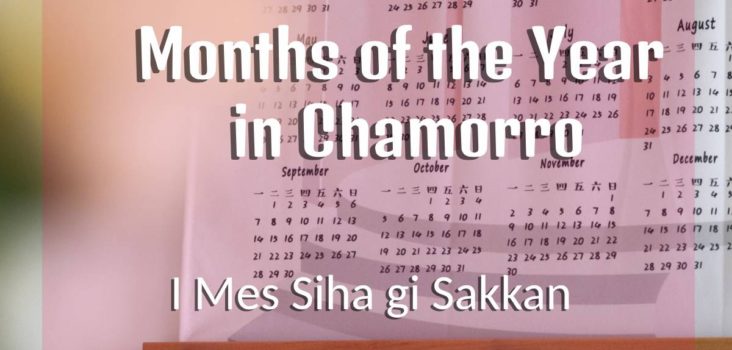Chamorro Word Stress
Where you put the stress on a word in Chamorro will help you to be understood by native speakers. It’s important in many languages as it can change the meaning of the word. Take for instance the word desert. At first glance, your thoughts immediately go to a dry, barren expanse of land with lots of sand. That’s because you read the word as DEH-zehrt, with the stress on the first syllable. Now try reading it again with the stress on the second syllable and now your thoughts turn towards abandoning someone or something. With the stress on the first syllable, the word desert is the noun, but put the stress on the second syllable and you get desert as a verb.
There aren’t a lot of words like this; that is words that change meaning depending on the stress. In fact, you need only to remember a few rules when it comes to understanding which syllable of a word to emphasize.
Which syllable has the stress?
For the most part, the stress is placed on the penultimate (a fancy term meaning “second to the last”) syllable of a word. For a two-syllable word that stress will be on the first syllable.
hågu – HUH-goo
tåya’ – TUH-dzah
go’te – GOH-tee
lepblo – LEHP-bloo
With three-syllable words:
kareta – kah-REH-tah
ga’lågu – gah-LUH-goo
kastigu – kahs-TEE-goo
This rule of placing the stress on the penultimate syllable is still followed when adding a possessive determiner (i.e. -hu, -ku, -mu, etc.). The possessive determiner is considered part of the word.
lepblo – LEHP-bloo → lepblo-ku – lep-BLOH-koo
kareta – kah-REH-tah → karetå-hu – kah-reh-TUH-hoo
Please note that the possessive determiners -måmi, -miyu and -ñiha have two syllables, so the stress will lie on the first syllable
karetan-måmi – kah-reh-tahn-MUH-mee
lugåt-miyu – loo-gaht-MEE-dzoo
gima’-ñiha – gee-mah-NYEE-hah
Chamorro Word Stress in Words Derived from Prefixes
There are words in Chamorro derived by using a prefix. When this happens, the stress is usually on the prefix.
Prefix a – reciprocal prefix (i.e. to do an action to “each other” )
atungo’ – AH-too-ngoo
asodda’ – AH-sohd-dah
Prefix e – Prefix meaning “to hunt for”
epånglao – EH-pahng-lah-oh
esalåpe’ – EH-sah-lah-pee
Prefix acha – Prefix denoting equality
achamaolek – a-CHA-mah-oh-lick (maolek = good)
achametgot – a-CHA-met-goot (metgot = strong)
Prefix hat – Prefix denoting movement towards or away from a subject
hatmagi – HAHT-mah-gee
hatguatu – HAHT-gwah-too
Prefix na’ – Causative prefix meaning to cause something to be. Words created from prefix na’ actually have two ways they can be understood. If we place the stress on the penultimate syllable (second to the last), the word is understood as a verb, BUT if the stress is on the prefix na’, it will be understood as an adjective. For example, the word na’puti pronounced nah-POO-tee will be understood as to cause someone pain. But if it’s pronounced NAH-poo-tee, it will be taken as an adjective and understood as “pain-causing” or “hurtful”.
When attaching a possessive determiner in the case of the a-derived nouns, it reverts back to stress on the penultimate syllable.
atungo’-hu – ah-too-NGOH-hoo
asodda’-hu – ah-sohd-DAH-hoo
Chamorro Word Stress in Words Borrowed from Spanish
Of course, there had to be exceptions, but fortunately, there are not too many of these. Most of these words have come from Spanish and have retained their original pronunciations.
interes (n. interest) – een-teh-REHS
mamadot (n. baby’s bottle) – mah-mah-DOHT
kulot (n. color) – koo-LOHT
tason (n. bowl) – tah-SOHN
prinsipi (n. prince) – PRIN-see-pee
åtbot (n. type of tree) – UHT-boot



